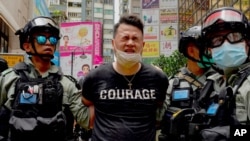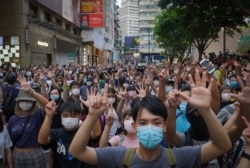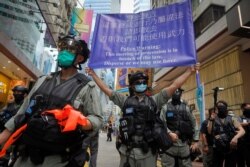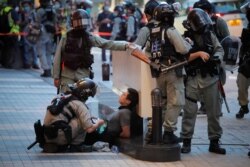About 370 demonstrators were arrested in Hong Kong on Wednesday after thousands protested China's new national security law that went into effect that day.
The police said 10 of those arrested had breached the new law for allegedly carrying independence signs and chanting independence slogans.
#BREAKING: Around 370 arrests, including 10 (6M&4F) for breaching #NationalSecurityLaw, have been made today. A total of 7 officers were injured on duty. Among the serious injuries, one was stabbed by a rioter with a dagger and three were hit by a rioter driving a motorcylce.
— Hong Kong Police Force (@hkpoliceforce) July 1, 2020
Hong Kong lawmakers told VOA the large gatherings reflect sentiments toward the new law and mainland China.
Rise of anti-China sentiment
Hong Kong police had previously banned the annual July 1 march, citing a social distancing regulation brought about by the coronavirus pandemic that prohibits the gathering of more than 50 people.
July 1 marked the 23rd anniversary of the handover of Hong Kong from Britain to China. It is also the first day of the official implementation of the national security law for Hong Kong.
Tens of thousands of Hong Kongers defied the ban, and police used water cannon, pepper spray and tear gas to disperse protesters. Police said seven officers were injured while on duty.
Ching, a 13-year-old female student, went to the protest with her father and two sisters. She told VOA that they oppose the law because it erodes human rights and freedom.
"We would just become another Chinese city. If you dare to speak your mind, you might get arrested," Ching said.
She added that she is worried she and her family might face charges by participating in the protest.
"But if we don't do so, we might lose the opportunity to even protest," she said.
Fung, a 23-year-old university graduate, joined the protest with his girlfriend. He saw the police cite Hong Kong's first national security law and raise purple warning flags to those who shouted independence slogans for the first time.
"Honestly, even without the new law, the police can arrest you based on current public security regulations. But this law is so vague, it basically gives the police more legal power to arrest more people," he said.
Both Ching and Fung requested to be identified by their last names.
Kacey Wong, a 50-year-old performance artist, participates in the July 1 parades every year. This year, his theme is "shopaholic." Dressed like a rich shopper from mainland China, he held multiple shopping bags with Chinese characters labeled separatism, subversion, collusion, terrorism — all crimes listed in the new national security law.
"These words are starting to make people feel uneasy. Even people who don't participate in social movements are getting nervous. I want to reflect that sentiment in my art," Wong told VOA.
Intimidation
Fernando Cheung, vice chairman of the center-left Labor Party and a member of the Legislative Council, told VOA the fact that tens of thousands of people participated in the protest despite the police ban shows that China's Communist Party cannot win the hearts and minds of Hong Kongers through intimidation.
Cheung said that Beijing ignored the international community's concerns and insisted on implementing the law to intimidate the people of Hong Kong.
"Hong Kongers' action on the day the law came into effect shows that we are fearless," he said.



